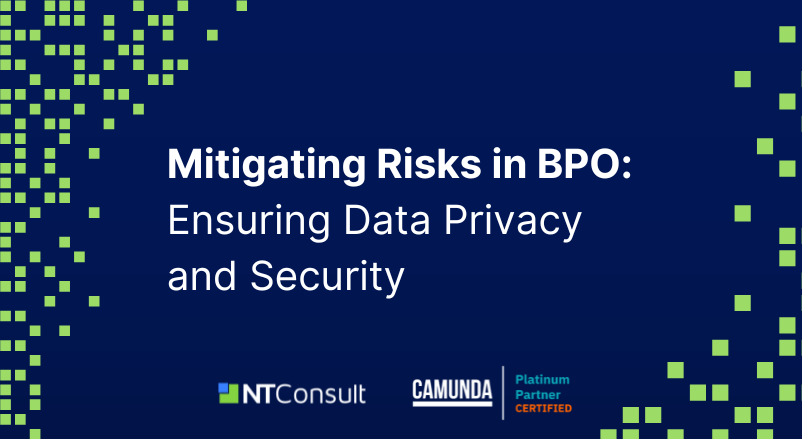Business process orchestration (BPO) enables seamless workflows and streamlined operations. However, this interconnectedness also increases the risk of data breaches, compliance failures, and unauthorized access. As organizations adopt business process orchestration tools to manage sensitive information, ensuring robust data security in BPO becomes a strategic priority. To avoid vulnerabilities and protect valuable assets, companies need a comprehensive approach to data security.
This blog explores strategies for mitigating risks in BPO, emphasizing proactive data protection and compliance measures.
The Data Privacy Risks in BPO
When sensitive data flows across multiple systems during process orchestration, vulnerabilities can arise at every touchpoint. The risk factors include:
- Data breaches: Unauthorized access to sensitive information can lead to financial losses and reputational harm.
- Human error: Mistakes in data entry or improper access management can expose sensitive information.
- Insufficient access controls: Without role-based permissions, sensitive data may be accessible to unauthorized team members.
Implementing business process orchestration tools with advanced security capabilities can identify potential risks by performing a comprehensive risk assessment, streamlining workflows and enforcing compliance checkpoints.
Key Strategies for Mitigating Risks in BPO
1. Strengthen Data Security Frameworks
To secure business processes, organizations must prioritize the integration of robust security protocols, including:
- Data encryption: Ensure that sensitive data is encrypted both in transit and at rest.
- Access control mechanisms: Implement role-based access to prevent unauthorized access.
- Network security measures: Deploy firewalls, intrusion detection systems, and endpoint protection to detect anomalies.
By adopting integrated automation solutions, businesses can create secure environments that reduce their exposure to cyber threats.
2. Utilize Business Process Orchestration Tools for Compliance
Modern business process orchestration tools support automated compliance checks that detect vulnerabilities in real-time. These tools also enable:
- Audit trails: Comprehensive logs of system interactions for enhanced traceability.
- Regulatory adherence: Automatic validation of processes against compliance regulations.
This ensures that businesses adhere to industry standards and avoid costly penalties for non-compliance.
3. Implement Data Breach Prevention Measures
Data breach prevention in BPO relies on a proactive approach. Companies can achieve this by:
- Conducting regular security audits: Frequent assessments identify weak points in workflows and network security.
- Multi-factor authentication (MFA): Reinforce access controls with MFA to reduce the likelihood of unauthorized access.
- Real-time monitoring: Continuous system monitoring enables faster detection of suspicious activities.
With these practices in place, organizations can protect sensitive data and mitigate unauthorized access.
4. Employee Training for Data Security in BPO
Human error remains one of the most significant contributors to data security incidents. Comprehensive employee training programs ensure that staff members are familiar with security protocols and best practices. Key training components include:
- Recognizing phishing attempts: Educating employees to detect fraudulent emails and links.
- Data handling procedures: Clear guidelines for securely accessing and sharing sensitive data.
- Incident reporting: Empowering employees to report security concerns without fear of repercussions.
By fostering a culture of security awareness, businesses can strengthen their defenses against potential threats.
5. Establish Contingency Plans
No system is entirely immune to breaches or disruptions. Having a contingency plan in place ensures that businesses can respond quickly and minimize downtime. Key elements of an effective contingency plan include:
- Data backup and recovery: Regular backups and reliable recovery protocols to restore critical data during outages.
- Incident response strategy: A documented plan for identifying and containing security incidents.
- Communication plan: Procedures for informing stakeholders in the event of a data breach.
Proactive planning can significantly reduce the impact of service disruptions on business operations.
The Benefits of Mitigating Risks in BPO with Advanced Automation
When implementing BPO strategies, using integrated business automation technologies enhances security while improving operational efficiency. Some of the key benefits include:
- Improved scalability and flexibility: Automation scalability and flexibility allow businesses to adapt to evolving regulatory requirements and market changes.
- Reduced operational costs: By minimizing the risk of data breaches and non-compliance, businesses save on costs associated with penalties, recovery, and lost productivity.
- Streamlined processes: Business orchestration technologies unify workflows, eliminating redundancies and ensuring smoother operations.
Adopting advanced automation solutions ensures that BPO processes are resilient, agile, and aligned with organizational goals.
Implementing BPO Strategies with NTConsult
NTConsult’s expertise in business process orchestration and automation positions us as a trusted partner in mitigating risks in BPO. Our solutions integrate AI-driven capabilities and machine learning to enhance risk detection, prevent data breaches, and optimize workflows. We offer tailored automation solutions that include:
- Comprehensive security assessments: Identify and address vulnerabilities before they become threats.
- Seamless integration: Implement secure connections across existing systems and third-party platforms.
- Ongoing support and training: Equip your teams with the tools and knowledge to maintain compliance and operational efficiency.
By partnering with NTConsult, you can strengthen your data privacy strategy and achieve peace of mind.
Securing the Future of BPO
Mitigating risks in BPO is essential to ensure data privacy, regulatory compliance, and operational continuity. By adopting business process orchestration tools, robust risk assessment plans, and proactive data security measures, organizations can protect sensitive information and build resilient operations. NTConsult’s tailored solutions empower businesses to implement secure, efficient workflows that enhance productivity and customer trust.
Ready to secure your business processes? Contact NTConsult today to learn more about how we can help you protect your data and optimize your BPO strategy.


 Portuguese
Portuguese Spanish
Spanish


